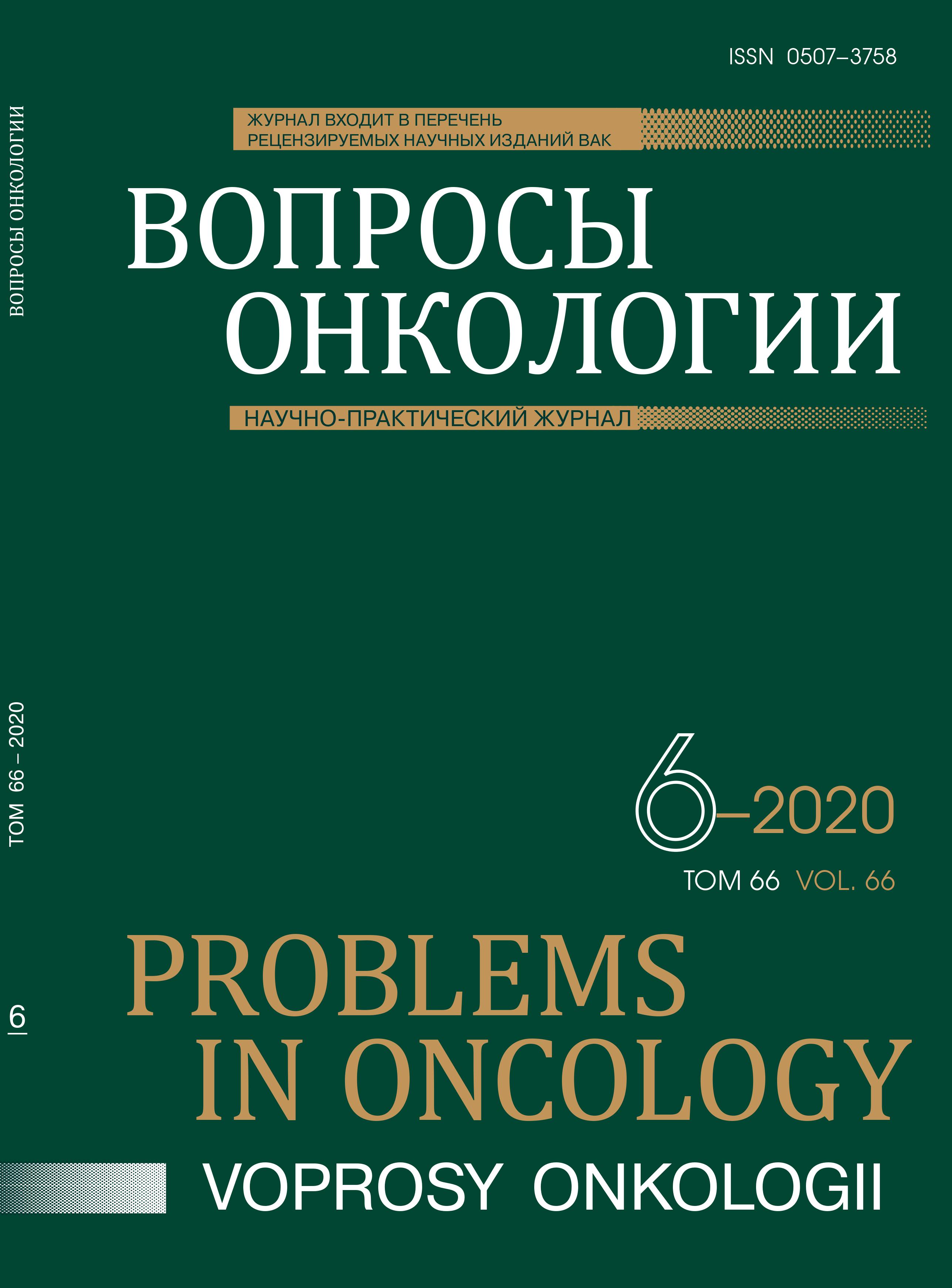摘要
Цель исследования. Гетерогенность экспрессии рецепторов-мишеней может являться причиной различий ответа первичной опухоли и метастазов почечно-клеточного рака (ПКР) на противоопухолевую терапию ингибиторам рецепторных тирозинкиназ. Целью исследования являлось изучение экспрессии и прогностической значимости ростовых факторов: фактор роста эндотелия сосудов (VEGFA) и фактора роста фибробластов (FGF2) и их рецепторов VEGFR-1–3, FGFR-1–2, а также рецепторов тромбоцитарного фактора роста (PDGFR-α, -β) на опухолевых клетках парных образцов первичной опухоли и метастазов у больных ПКР.
Материалы и методы. Исследование было проведено на операционном материале, полученном при удалении опухоли почки и метастазов в надпочечниках у 21 больного ПКР, при помощи иммуногистохимического анализа с первичными антителами к VEGFA и FGF2 и рецепторным тирозинкиназам VEGFR-1–3, FGFR-1–2 и PDGFR-α, -β.
Результаты. Клетки метастазов ПКР в надпочечниках отличаются меньшим уровнем экспрессии VEGFА и FGF2, а также VEGFR-1 и VEGFR-3 по сравнению с первичной опухолью. Гиперэкспрессия ростовых факторов и их рецепторов опухолевыми клетками ассоциирована с неблагоприятными морфологическими признаками опухоли и плохим прогнозом жизни у больных ПКР.
Выводы. Экспрессия ростовых факторов и их тирозинкиназных рецепторов в клетках первичной опухоли и метастазов гетерогенна. Гиперэкспрессия изученных маркеров в клетках ПКР любой локализации ассоциирована с неблагоприятным прогнозом.
参考
Матвеев В.Б., Волкова М.И. Последовательная таргетная терапия при диссеминированном раке почки. Онкоурология. 2013;9(1):28-33.
Gerlinger M., Rowan A.J., Horswell S. et al. Intratumor heterogeneity and branched evolution revealed by multiregion sequencing. N Engl J Med. 2012;366(10):883-892.
de Velasco Guillermo, Wankowicz Stephanie A., Madison Russell, et al. Targeted genomic landscape of metastases compared to primary tumours in clear cell metastatic renal cell carcinoma. British Journal of Cancer. 2018;118:1238–1242.
Detre S., Saccani Jotti G., Dowsett M. A “quickscore” method for immunohistochemical semiquantitation: Validation for oestrogen receptor in breast carcinomas. J Clin Pathol. 1995;48: 876-878.
Tsimafeyeu I., Demidov L., Stepanova E. et al. Overexpression of fibroblast growth factor receptors FGFR1 and FGFR2 in renal cell carcinoma. Scand J Urol Nephrol. 2011;45(3):190–195.
Amin C., Wallen E., Pruthi R. et al. Preoperative tyrosine kinase inhibition as an adjunct to debulking nephrectomy. Urology. 2008;72:864–8.
Jonasch E., Wood C., Matin S. et al. (2009) Phase II presurgical feasibility study of bevacizumab in untreated patients with metastatic renal cell carcinoma. J Clin Oncol. 2009;27: 4076–4081.
Rini B.I., Escudier B.J., Michaelson M.D. et al. Phase III AXIS trial for second-line metastatic renal cell carcinoma (mRCC): Effect of prior first-line treatment duration and axitinib dose titration on axitinib efficacy. J Clin Oncol. 2012;30(Suppl. 5):354.
Rini B.I., Halabi S., Rosenberg J.E. et al. Phase III trial of bevacizumab plus interferon alfa versus interferon alfa monotherapy in patients with metastatic renal cell carcinoma: final results of CALGB 90206. J Clin Oncol. 2010;28:2137−43.
Escudier B., Eisen T., Stadler W.M. et al. Sorafenib in advanced clear-cell renal-cell carcinoma. N Engl J Med. 2007;356:125–34.
Escudier B., Pluzanska A., Koralewski P. et al. AVOREN Trial investigators. Bevacizumab plus interferon alfa-2a for treatment of metastatic renal cell carcinoma: a randomised, double-blind phase III trial. Lancet. 2007;370(9605):2103–11.
Tsimafeyeu I., Ludes-Meyers J., Stepanova E. et al. Targeting FGFR2 with alofanib (RPT835) shows potent activity in tumour models. Eur J Cancer. 2016;61:20–28.
Sternberg C.N., Davis I.D., Mardiak J. et al. Pazopanib in locally advanced or metastatic renal cell carcinoma: results of a randomized phase III trial. J Clin Oncol. 2010;28:1061−8.
Tyulyandina A., Harrison D., Yin W. et al. Alofanib, an allosteric FGFR2 inhibitor, has potent effects on ovarian cancer growth in preclinical studies. Invest New Drugs. 2017;35(2):127–133.
Choueiri T.K., Escudier B., Powles T. et al. Cabozantinib versus everolimus in advanced renal cell carcinoma (METEOR): final results from a randomised, open-label, phase 3 trial. Lancet Oncol. 2016;17:917–27.
Hutson T.E., Larkin J.M., Gold A. et al. A phase Ib clinical trial of the multitargeted kinase inhibitor lenvatinib (E7080) in combination with everolimus for treatment of metastatic renal cell carcinoma (RCC). J Clin Oncol. 2013;31(Suppl. 6):358.
Tsimafeyeu I., Borisov P., Abdelgafur A. et al. Phase 2 Multicenter Single-Arm Study of Second-Line Axitinib in Favorable Risk Patients with Metastatic Renal Cell Carcinoma: FavorAx. Target Oncol. 2019;14(1):33–38.
Sulzbacher I., Birner P., Traxler M. et al. Expression of platelet-derived growth factor-αα receptor is associated with tumor progression in clear cell renal cell carcinoma. Am J Clin Pathol. 2003;120:107–112.
Tawfik O.W., Kramer B., Shideler B. et al. Prognostic significance of CD44, platelet-derived growth factor receptor alpha, and cyclooxygenase 2 expression in renal cell carcinoma. Arch Pathol Lab Med. 2007 Feb;131(2):261-7.
Fujimoto K., Ichimori Y., Yamaguchi H. et al. Basic fibroblast growth factor as a candidate tumor marker for renal cell carcinoma. Jpn J Cancer Res. 1995; 86:182–186.
Duensing S., Grosse J., Atzpodien J. Increased serum levels of basic fibroblast growth factor (bFGF) are associated with progressive lung metastases in advanced renal cell carcinoma patients. Anticancer Res. 1995;15:2331–2333.
Rasmuson T., Grankvist K., Jacobsen J. et al. Impact of serum basic fibroblast growth factor on prognosis in human renal cellcarcinoma. Eur J Cancer. 2001;37(17):2199–2203.
Slaton J.W., Inoue K., Perrotte P. et al. Expression levels of genes that regulate metastasis and angiogenesis correlate with advanced pathological stage of renal cell carcinoma. Am J Pathol. 2001;158:735–743.
Tsimafeyeu I., Zaveleva E., Stepanova E., Low W. OM-RCA-01, a novel humanized monoclonal antibody targeting fibroblast growth factor receptor 1, in renal cell carcinoma model. Invest New Drugs. 2013;31(6):1436–1443.
Tsimafeyeu I., Volkova M., Olshanskaia A. et al. Expression of Receptor Tyrosine Kinases on Peripheral Blood Mononuclear Cells and Tumor-Infiltrating Lymphocytes in Patients with Renal Cell Carcinoma and Healthy Donors [published online ahead of print, 2020 Feb 13]. Oncology. 2020;1–7. doi:10.1159/000505373.

This work is licensed under a Creative Commons Attribution-NonCommercial-NoDerivatives 4.0 International License.
© АННМО «Вопросы онкологии», Copyright (c) 2020

